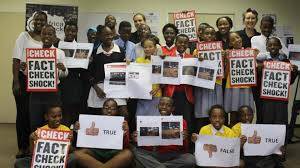Battling Election Misinformation in Ghana: How Fact-Checkers Are Protecting Democracy
In an era where misinformation spreads like wildfire, Ghana's 2024 elections faced a significant threat: fake news, propaganda, and digital disinformation. With the rapid rise of social media, false narratives had the potential to sway voter opinions, undermine trust in the electoral process, and even incite political unrest. To combat this, a coalition of fact-checking organizations stepped up to safeguard democracy by ensuring the public received accurate and verified information.
The Rise of Election Misinformation in Ghana
The internet has revolutionized communication, but it has also made it easier for misinformation to spread. During the election period, fake news stories, doctored images, and misleading videos circulated on platforms such as Facebook, Twitter (now X), WhatsApp, and TikTok. Some of these false reports targeted presidential candidates, political parties, and election officials, aiming to create confusion and distrust.
One viral hoax claimed that the Electoral Commission had secretly added thousands of extra votes in favor of one candidate. Another widely shared video falsely suggested that election results had been rigged before votes were even counted. These misleading narratives had the potential to incite violence, prompting the need for robust fact-checking mechanisms.
How Fact-Checking Organizations Responded
Recognizing the urgent need to counteract election misinformation, Ghanaian fact-checking organizations mobilized to provide real-time verification of viral claims. Teams from media houses and independent watchdog groups, including Fact-Check Ghana, Dubawa, and Africa Check, worked tirelessly to analyze and debunk misleading content.
1. AI-Powered Fact-Checking Tools
Leveraging artificial intelligence (AI), fact-checkers used automated tools to detect deepfake videos, doctored images, and fabricated news articles. AI-powered software analyzed content patterns, cross-referenced sources, and flagged suspicious posts for further review.
2. Collaboration with Media Houses
To expand their reach, fact-checking groups partnered with over 100 media outlets. Journalists were trained to recognize misinformation and use verification tools to fact-check news before publication. This collaboration ensured that the mainstream media did not inadvertently amplify false narratives.
3. Social Media Monitoring and Rapid Response
With social media being the primary channel for misinformation, fact-checkers maintained 24/7 monitoring teams. They used keyword tracking and sentiment analysis to identify trending falsehoods and debunk them before they gained widespread traction. Verified corrections were then disseminated using hashtags, video explainers, and infographics to ensure maximum visibility.
Impact of Fact-Checking on the 2024 Elections
The efforts of these fact-checking organizations significantly reduced the influence of misinformation during Ghana’s elections. Within a span of three months, fact-checkers debunked over 500 misleading claims, preventing their spread to millions of potential voters.
Moreover, social media platforms took action by partnering with Ghanaian fact-checkers to flag false information and add warning labels to deceptive content. This prevented many users from unknowingly sharing misinformation.
Challenges Faced by Fact-Checkers
Despite their successes, fact-checkers in Ghana encountered several obstacles:
Political Bias Accusations: Some groups accused fact-checkers of being politically biased, questioning the neutrality of their reports.
Limited Resources: Fact-checking is resource-intensive, requiring skilled analysts, AI tools, and significant funding.
Misinformation Fatigue: Some citizens, overwhelmed by conflicting narratives, struggled to differentiate fact from fiction, leading to skepticism even about verified information.
The Future of Fact-Checking in Ghana
With Ghana’s increasing reliance on digital media, misinformation is likely to remain a persistent challenge. To strengthen fact-checking efforts, stakeholders are advocating for:
Stronger Digital Literacy Programs: Educating citizens on how to identify fake news can empower them to make informed decisions.
Enhanced Collaboration with Tech Giants: Working closely with Facebook, TikTok, and X to develop better misinformation detection systems.
Government Support Without Censorship: Encouraging policies that support fact-checking initiatives without infringing on free speech.
Conclusion
Ghana’s 2024 elections showcased the critical role of fact-checking in preserving democracy. While misinformation remains a formidable challenge, the dedication of fact-checkers has proven that truth can prevail over falsehoods. Moving forward, continued collaboration, innovation, and public education will be essential in ensuring that future elections remain free from the harmful influence of disinformation.
As technology evolves, so too must our defenses against digital deception. By investing in fact-checking infrastructure and fostering a culture of truth, Ghana can set an example for the rest of Africa in the fight against election misinformation.


